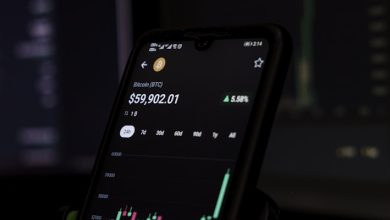What is Crypto Mining? A Beginner’s Guide

- Understanding the Basics of Crypto Mining
- The Process of Generating Cryptocurrency through Mining
- How Mining Secures the Blockchain Network
- Choosing the Right Hardware for Crypto Mining
- The Role of Miners in the Cryptocurrency Ecosystem
- Tips for Getting Started with Crypto Mining
Understanding the Basics of Crypto Mining
Crypto mining is the process of validating transactions on a blockchain network by solving complex mathematical problems using powerful computers. Miners compete to be the first to solve these problems and add a new block to the blockchain. In return for their efforts, miners are rewarded with newly minted cryptocurrency coins. This process not only secures the network but also ensures the integrity of transactions.
Understanding the basics of crypto mining is essential for anyone interested in getting involved in this lucrative industry. To start mining, you will need specialized hardware known as mining rigs, which are designed to handle the intense computational requirements of mining. Additionally, you will need access to cheap electricity to power your mining operation, as it can be energy-intensive.
It is important to note that crypto mining is not a guaranteed way to make money, as it requires a significant investment in hardware and electricity costs. The mining landscape is also highly competitive, with large mining pools dominating the market. However, with the right knowledge and resources, mining can be a profitable venture for those willing to put in the effort.
The Process of Generating Cryptocurrency through Mining
Cryptocurrency mining is the process of verifying transactions on a blockchain network by solving complex mathematical problems using computer hardware. This process is crucial for securing the network and validating transactions without the need for a central authority.
Miners compete to solve these mathematical problems, with the first one to find the correct solution being rewarded with a certain amount of cryptocurrency. This reward acts as an incentive for miners to continue verifying transactions and maintaining the network.
To start mining, miners need specialized hardware that is capable of performing the necessary calculations quickly and efficiently. This hardware can range from basic CPUs and GPUs to more advanced ASIC miners designed specifically for cryptocurrency mining.
Once the hardware is set up, miners join a mining pool or mine solo, depending on their preference and resources. Mining pools allow miners to combine their computational power to increase their chances of solving the mathematical problems and receiving rewards more frequently.
As the number of miners on the network increases, the difficulty of the mathematical problems also increases to ensure that new blocks are added to the blockchain at a consistent rate. This difficulty adjustment helps maintain the integrity and security of the network.
How Mining Secures the Blockchain Network
One of the key functions of mining in the world of cryptocurrency is to secure the blockchain network. This process involves miners competing to solve complex mathematical puzzles in order to validate transactions and add them to the blockchain. As more miners participate in the network, the level of security increases, making it more difficult for malicious actors to manipulate the system.
By dedicating computational power to solving these puzzles, miners are essentially providing a layer of protection for the blockchain network. Each block that is added to the blockchain contains a cryptographic hash of the previous block, creating a chain of blocks that is extremely difficult to alter without the consensus of the majority of the network.
In addition to securing the network, mining also plays a crucial role in the distribution of new coins. Miners are rewarded with newly minted coins for their efforts in validating transactions and maintaining the integrity of the blockchain. This incentivizes miners to continue participating in the network and ensures that there is a constant supply of new coins being introduced into circulation.
Overall, mining is essential for the security and stability of the blockchain network. Without the efforts of miners, the integrity of the network would be compromised, leaving it vulnerable to attacks and manipulation. As the popularity of cryptocurrencies continues to grow, mining will remain a critical component of the ecosystem, helping to ensure that transactions are secure and reliable.
Choosing the Right Hardware for Crypto Mining
When it comes to crypto mining, choosing the right hardware is crucial for success. There are several factors to consider when selecting your equipment.
One important factor to consider is the hash rate of the hardware. The higher the hash rate, the more calculations the hardware can perform, increasing the chances of mining a block and earning rewards.
Another key consideration is the energy efficiency of the hardware. Mining can be energy-intensive, so choosing energy-efficient hardware can help reduce costs and maximize profits.
Additionally, the cost of the hardware is an important factor to consider. You want to make sure that the cost of the hardware is justified by the potential rewards you can earn through mining.
Some popular hardware options for crypto mining include ASIC miners, GPUs, and CPUs. ASIC miners are specifically designed for mining cryptocurrencies and offer high hash rates. GPUs are more versatile and can be used for other tasks besides mining. CPUs are less powerful but can still be used for mining certain cryptocurrencies.
Ultimately, the best hardware for crypto mining will depend on your budget, energy costs, and mining goals. It’s important to research and compare different options to find the hardware that is right for you.
The Role of Miners in the Cryptocurrency Ecosystem
Mining plays a crucial role in the cryptocurrency ecosystem. Miners are responsible for verifying transactions on the blockchain network by solving complex mathematical problems. This process requires substantial computational power and energy consumption.
Miners compete with each other to add new blocks to the blockchain and receive rewards in the form of newly minted coins. This process is known as proof-of-work, where miners prove their work by finding the correct solution to the mathematical problem.
Without miners, the cryptocurrency network would not be able to function effectively. They ensure the security and integrity of the system by preventing double-spending and other fraudulent activities. Miners play a vital role in maintaining the decentralized nature of cryptocurrencies.
As the number of miners increases, the difficulty of mining also rises, requiring more computational power to solve the mathematical problems. This competition among miners ensures that the network remains secure and transactions are processed efficiently.
In conclusion, miners are essential to the operation of the cryptocurrency ecosystem. Their role in verifying transactions, adding new blocks to the blockchain, and maintaining network security cannot be understated. Mining is a competitive and energy-intensive process that forms the backbone of the decentralized cryptocurrency system.
Tips for Getting Started with Crypto Mining
If you are considering getting started with crypto mining, here are some tips to help you navigate this exciting new world. First, make sure you have the right hardware for mining. This typically involves using a powerful GPU or CPU to solve complex mathematical equations. Additionally, you will need to choose a mining pool to join forces with other miners and increase your chances of earning rewards.
Next, familiarize yourself with mining software options that are compatible with your chosen cryptocurrency. These programs will help you manage your mining activities and track your progress. It’s also important to consider the costs associated with mining, including electricity and cooling expenses.
Another important tip is to stay informed about the latest developments in the world of cryptocurrency mining. This industry is constantly evolving, so it’s crucial to keep up with changes that could affect your mining operation. Finally, don’t be afraid to experiment and try different strategies to optimize your mining setup for maximum efficiency and profitability.



